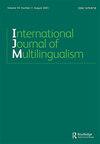学生对非母语环境下在线学习的看法
IF 2
1区 文学
Q2 EDUCATION & EDUCATIONAL RESEARCH
引用次数: 0
摘要
摘要本研究旨在探讨沙特大学生在2019冠状病毒病期间对在线学习的看法。为此,共有198名学生完成了调查。调查结果显示,“在线学习的有效性”、“在线学习的互动性”和“在线学习的反动性”这三个因素解释了46.67%的结果差异。此外,学生们对在线学习的灵活性和舒适性表现出了极大的赞赏。他们还承认,在线学习有助于提高他们的学习成绩,增加他们的动力,分享想法,并在小组中与同龄人互动。然而,学生们表达了他们对在线学习的不满,因为他们与老师的互动减少了,孤独感和孤立感增加了,无法适应各种学习方式,也无法控制学习。根据现有文献和在线教育的多模态模型对研究结果进行了解释。研究人员感谢苏丹王子大学和佛罗里达海湾沿岸大学通过研究实验室[应用语言学研究实验室- RL-CH-2019/9/1]资助本研究项目。披露声明作者未报告潜在的利益冲突。研究人员感谢苏丹王子大学和佛罗里达海湾海岸大学通过研究实验室[应用语言学研究实验室- RL-CH-2019/]资助本研究项目。本文章由计算机程序翻译,如有差异,请以英文原文为准。
Students’ perceptions of online learning in non-L1 environments
ABSTRACTThe current study aimed to explore the perceptions of Saudi undergraduate students towards online learning during COVID-19. A total of 198 students completed a survey to this end. The results of the survey showed that the three factors referred to as ‘effectiveness of online learning,’ ‘interactivity of online learning’ and ‘counteractive online learning’ explained 46.67% of the variance in results. Additionally, the students showed great appreciation for the flexibility and comfort related to online learning. They also acknowledged that online learning helped improve their academic performance, increase their motivation, share ideas, and interact with peers in groups. However, the students expressed their dissatisfaction with online learning with respect to reduced interaction with the instructor, the increased sense of loneliness and isolation, the inability to cater for the variety of learning styles, and their inability to control learning. The results are interpreted in terms of the existing literature and the Multimodal Model of Online Education.KEYWORDS: Online learningCOVID-19multimodal model for online educationnon-L1 learning environments AcknowledgmentsThe researchers thank Prince Sultan University and Florida Gulf Coast University for funding this research project through the research lab [Applied Linguistics Research Lab - RL-CH-2019/9/1].Disclosure statementNo potential conflict of interest was reported by the authors.Additional informationFundingThe researchers thank Prince Sultan University and Florida Gulf Coast University for funding this research project through the research lab [Applied Linguistics Research Lab - RL-CH-2019/].
求助全文
通过发布文献求助,成功后即可免费获取论文全文。
去求助
来源期刊

International Journal of Multilingualism
Multiple-
CiteScore
6.10
自引率
8.70%
发文量
67
期刊介绍:
The aim of the International Journal of Multilingualism (IJM) is to foster, present and spread research focused on psycholinguistic, sociolinguistic and educational aspects of multilingual acquisition and multilingualism. The journal is interdisciplinary and seeks to go beyond bilingualism and second language acquisition by developing the understanding of the specific characteristics of acquiring, processing and using more than two languages. The International Journal of Multilingualism (IJM) provides a forum wherein academics, researchers and practitioners may read and publish high-quality, original and state-of-the-art papers describing theoretical and empirical aspects that can contribute to advance our understanding of multilingualism.Topics of interest to IJM include, but are not limited to the following: early trilingualism, multilingual competence, foreign language learning within bilingual education, multilingual literacy, multilingual identity, metalinguistic awareness in multilinguals, multilingual representations in the mind or language use in multilingual communities. The editors encourage the submission of high quality papers on these areas as well as on other topics relevant to the interest of the International Journal Multilingualism (IJM). Reviews of important, up-to-date, relevant publications and proposals for special issues on relevant topics are also welcome.
 求助内容:
求助内容: 应助结果提醒方式:
应助结果提醒方式:


